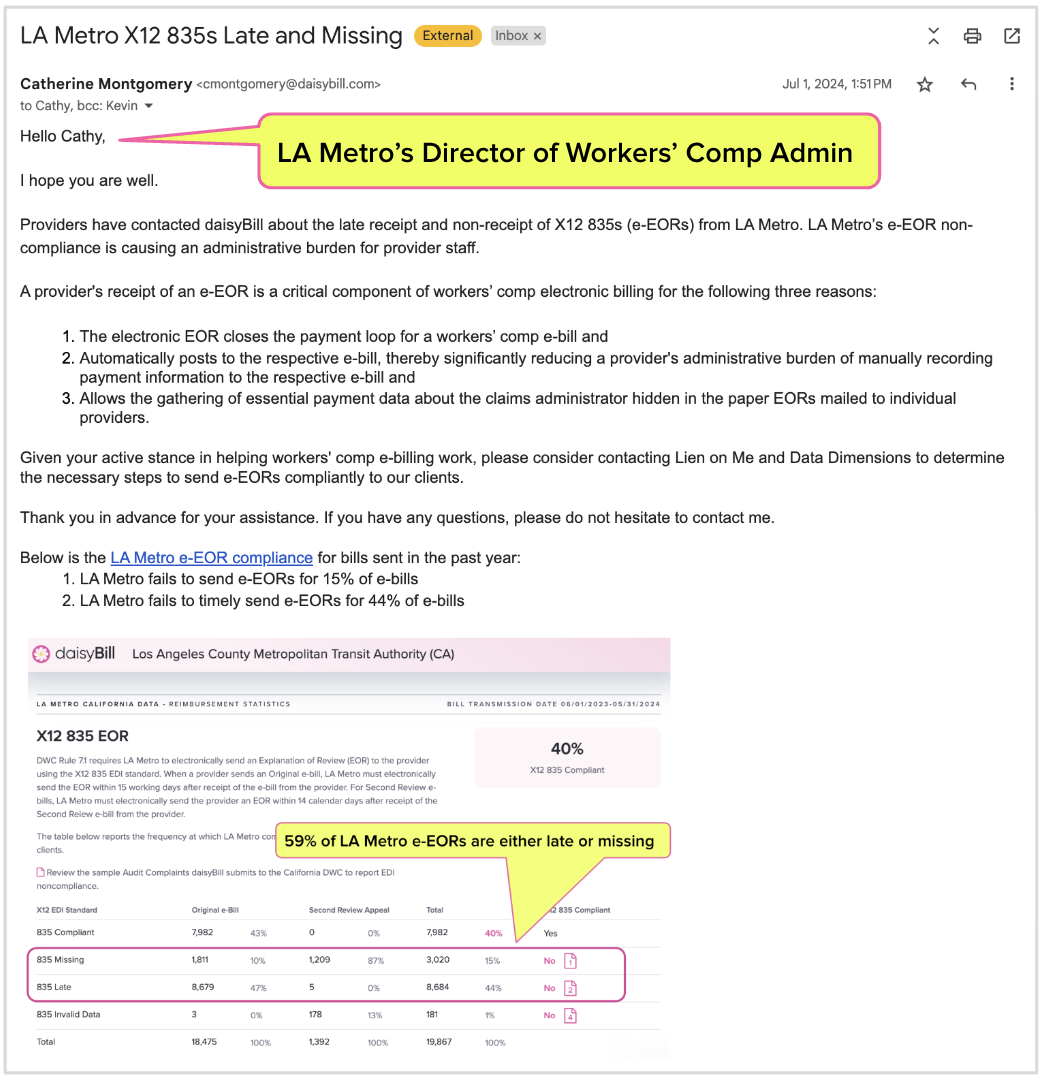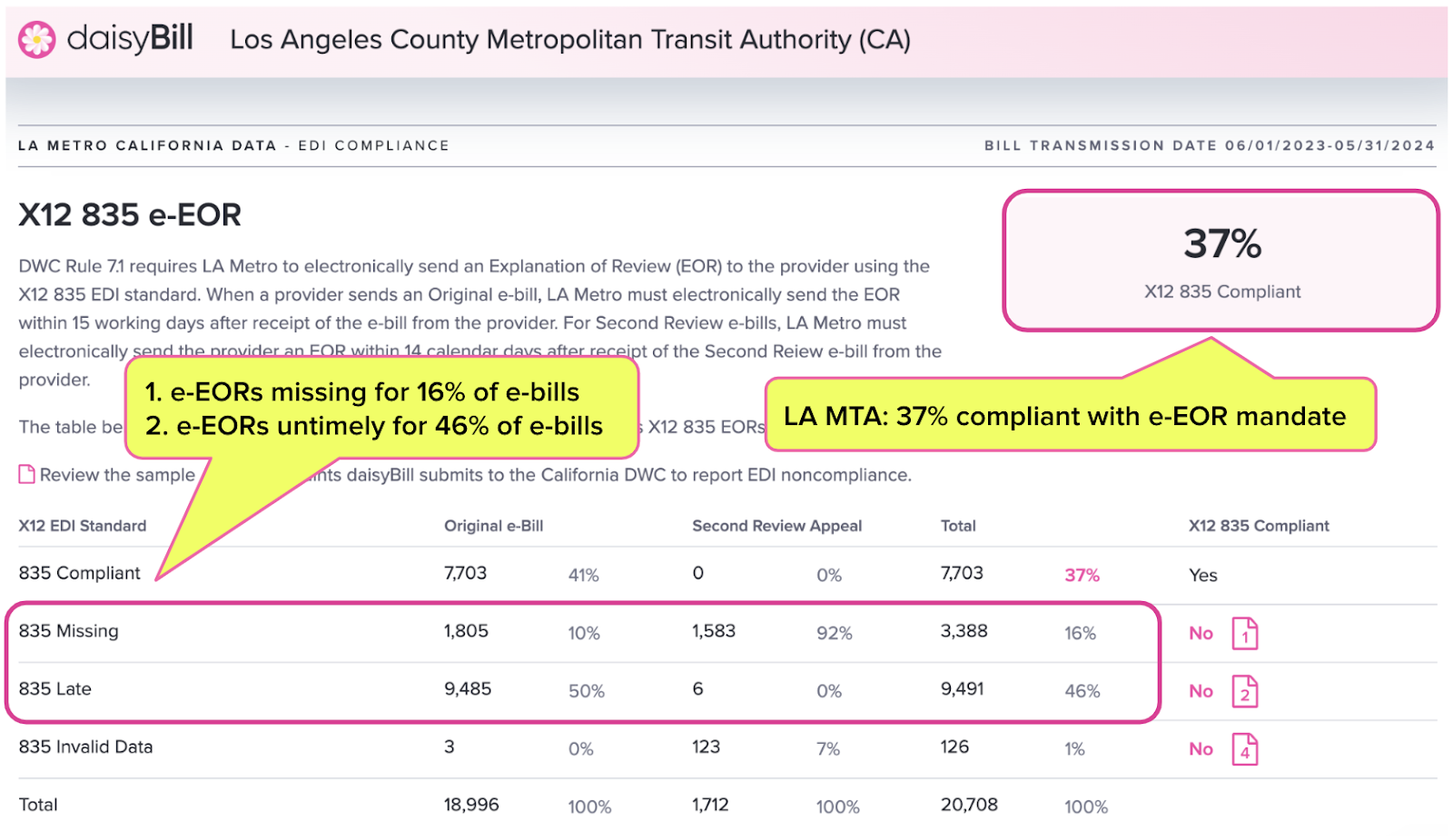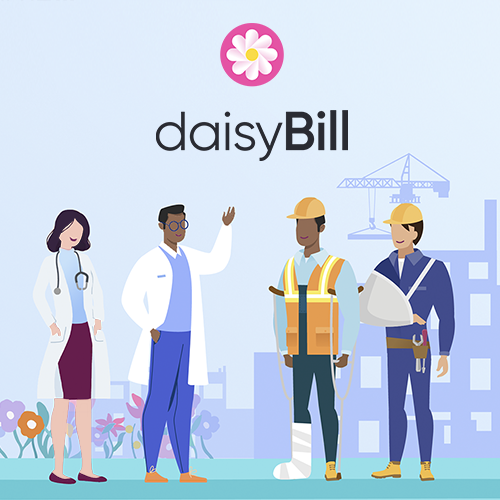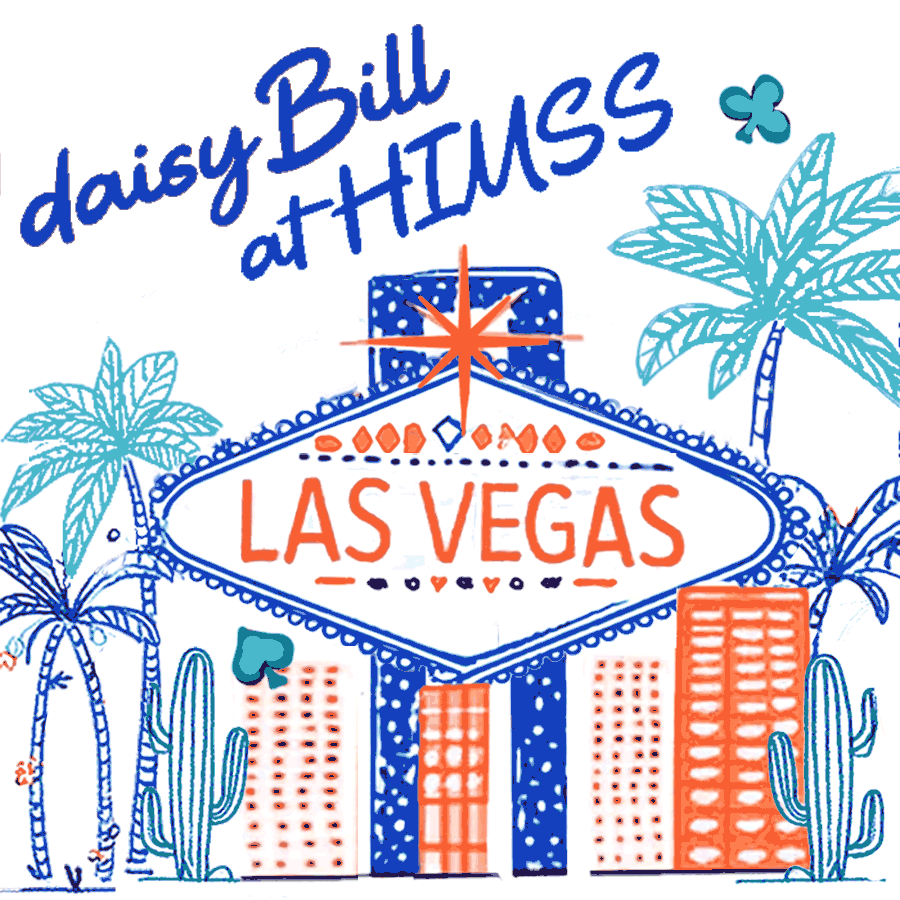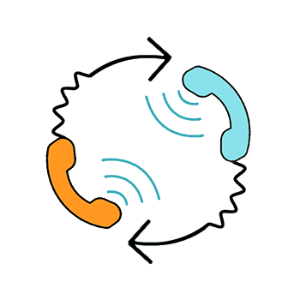LA Metro Transit Authority: 12,879 Audit Complaints Filed

The Los Angeles County Metropolitan Transit Authority (LA Metro), a public self-insured employer, fails to fulfill one of its most basic (but essential) legal obligations to providers: sending electronic Explanations of Review (e-EORs) in response to electronic bills.
When daisyBill reached out to find a solution, LA Metro’s only response was silence.
As we are forced to remind non-compliant claims administrators far too often, e-EORs are critical to workers’ comp e-billing—which is probably why California e-billing regulations require them. e-EORs automatically post payment details to the provider’s e-billing system, enabling infinitely faster, better, and more efficient revenue management.
Unfortunately, when it comes to compliance (and responding to polite requests), LA Metro has missed the bus.
Not Even Bus Fumes From LA Metro
Recently, several daisyBill providers contacted daisyBill complaining that LA Metro failed to comply with California’s e-EORs requirements. Accordingly, daisyBill emailed LA Metro to ask—politely—for compliance.
Typically, daisyBill reaches out to claims administrators that are failing to comply with California’s e-EOR requirements. We simply want these claims administrators to step up and take responsibility for making e-billing work for providers (for two recent excellent examples, see acūrrō and the City and County of San Francisco).
Accordingly, below is the email daisyBill’s CEO, Catherine Montgomery, sent to Cathy Yates, LA Metro’s Director of workers’ comp admin, on July 1, 2024. The email included LA Metro’s e-EOR compliance statistics as of July 1st, along with a reminder of the importance of e-EORs and a polite request to solve the problem (with our help, if necessary).
All we heard back was the distinct sound of crickets.
Perhaps Ms. Yates is taking a page from Sedgwick’s book and ignoring California e-EOR requirements, because why bother?
LA Metro e-EOR Compliance Declines
Below is daisyData on LA Metro from our Claims Administrator Directory (screenshot below), showing that LA Metro’s e-EOR compliance has declined even further since our initial email, to an abysmal 37%.
This data shows that LA Metro has failed to send e-EORs for 16% of the e-bills sent by daisyBill providers. When LA Metro bothers to send the mandated e-EOR, it is late 46% of the time.
e-EORs Are Essential for Providers
Before electronic billing, workers’ comp providers were forced to manually enter payment details for each bill from paper EORs, which consumed excessive administrative time and resources.
Fortunately, we live in the 21st century, and California mandates that claims administrators accept e-bills and send timely e-EORs in response. e-Billing also benefits claims administrators, as electronic transmission vastly reduces administrative costs on both ends of the transaction.
In e-billing jargon, an e-EOR is known as an ‘X12 835’ file. California requires claims administrators to respond to e-bills by sending the providers’ billing software this standardized electronic file containing the required payment data that usually appears on a paper EOR.
Once the provider’s billing software receives the X12 835 file, the payment data is automatically posted to the appropriate bill. With e-bills and e-EORs, providers and claims administrators can work together to eliminate the administrative burden of treating injured workers.
Unfortunately, claims administrators like LA Metro fail to uphold their obligation to return EORs electronically, increasing providers' administrative costs.
12,879 Audit Complaints Filed
With no response from LA Metro, daisyBill is left with no recourse except to take the matter to the California Division of Workers’ Compensation (DWC) —yes, that DWC, but it’s the only DWC we’ve got.
Today, daisyBill submitted Audit Complaints reflecting 12,879 violations of the e-EOR mandate by the LA Metro. Per the instructions of the Audit Unit, this complaint was sent directly to Administrative Director George Parisotto.
The Audit Complaint is reproduced below in its entirety.
To: XXXXXXXX@dir.ca.gov
Subject: Los Angeles County Metropolitan Transit Authority EDI Non-compliance: X12 835 Missing Count 3,388 & X12 835 Late Count 9,491
Hello George,
Per an email exchanged on January 23, 2024 with the DWC Workers’ Compensation Compliance Manager, X12 835 Audit Complaints are now managed by the DWC Legal Unit. The email exchange confirmed that X12 835 Audit Complaints should be sent directly to you.
Below is an Audit Complaint reporting credible data that the Los Angeles County Metropolitan Transit Authority (LA Metro) failed to adhere to California EDI regulations, as follows:
- LA Metro failed to send 3,388 electronic EORs (X12 835) as mandated by California EDI regulations.
- LA Metro failed to send 9,491 electronic EORs (X12 835) in a timely manner as mandated by California EDI regulations.
This Audit Complaint data is aggregated from 12,879 workers’ comp e-bills submitted to LA Metro by daisyBill providers from June 1, 2023 through May 31, 2024.
A provider's receipt of an electronic EOR (X12 835) is a critical component of electronic billing for the following three reasons:
- The electronic EOR closes the payment loop for a workers’ comp e-bill and
- Automatically posts to the respective e-bill, thereby significantly reducing a provider's administrative burden of manually recording payment information to the respective e-bill and
- Allows the gathering of essential payment data about the claims administrator hidden in the paper EORs mailed to individual providers.
On 7/1/2024, I emailed LA Metro Director of Workers’ Compensation Admin Cathy Yates about this EDI non-compliance. LA Metro has failed to respond or provide a resolution.
I’ve attached two separate CSV lists containing a total of 12,879 e-bills providers submitted to LA Metro demonstrating the following:
#1 LA Metro Electronic EOR (X12 835) Missing - 3,388
For June 1, 2023 through May 31, 2024, this CSV lists 3,388 e-bills daisyBill providers submitted where LA Metro failed to return a mandated electronic EOR to the provider in response to the e-bill. The attached CSV list includes the following columns:
- Column L: [Bill] Transmission Date
- Column W: EOR (835) Compliance Due Date
- Column X: EOR (835) Receipt Date - This column is BLANK because LA Metro failed to send the provider an electronic EOR (835).
- Column AO: Patient Name
- Column AP: Claim Number
#2 LA Metro Electronic EOR (X12 835) Late - 9,491
For June 1, 2023 through May 31, 2024, this CSV lists 9,491 e-bills daisyBill providers submitted where LA Metro failed to timely return a mandated electronic EOR to the provider in response to the e-bill. The attached CSV list includes the following columns:
- Column L: [Bill] Transmission Date
- Column W: EOR (835) Compliance Due Date
- Column X: EOR (835) - The dates in this column are AFTER the EOR (835) Compliance Due Date
- Column AO: Patient Name
- Column AP: Claim Number
daisyBill tracks responses to your bills, appeals, and RFAs — so your practice knows when payers break the rules. Click below to learn more or schedule a demo.
LEARN MORE
DaisyBill provides content as an insightful service to its readers and clients. It does not offer legal advice and cannot guarantee the accuracy or suitability of its content for a particular purpose.
